| |
No part of the project which is United European Christendom is about Abandonment or Diminishment of
National Distinctions and Distinctiveness within and among our Constituent Countries and Cultures.
United European Christendom is about abandoment of partial truth as destructive and demonaic.
Cultural Subsidiarity is a Foundational Principle of Christendom.
Exaggerated Nationalism, by contrast, is the Bane of Orthodoxy as it is the enemy of Truth and Reason.
United Euroean Christendom is about the promotion of cultural richness in national Distinctiveness.
Opponents and Enemies of United European Christendom are, among other evils, interested in destroying
Cultural distinctiveness within the many Cultures of European Christendom,
in favor of the promotion of their anti-Church, anti-Christedom agenda of
Religious Indifferentism and One Atheist World Government. |
|
| |
|
|
| |
|
|
|
|
|
| |
Ethnophyletism – Филетизм – from the Greek ἔθνος (ethnos) "nation" + φυλετισμός (phyletismos) "tribalism":
a heresy and the Bane of Orthodoxy; the chief impediment to the Orthodox finding and presenting to the Catholic hierarchy a model of ecclesiastical Primacy at the universal level which is both canonical and viable. |
|
| |
|
|
| |
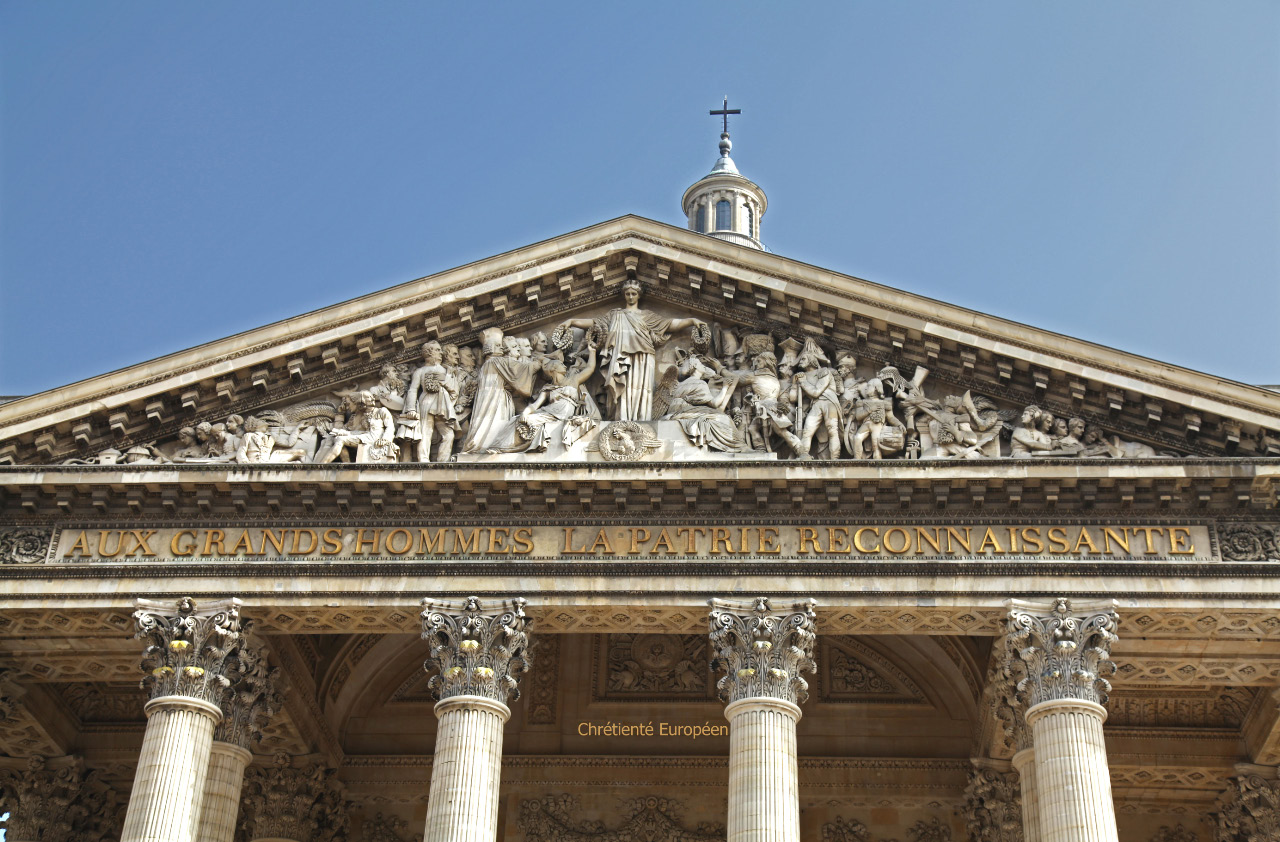 |
| |
Le Panthéon a été conçu et construit comme une église, dédiée à Sainte-Geneviève, avant d'être transformé au cours de la franc-maçonnerie Révolution française à un but incomparablement moins digne.
Il fera une belle mosquée pour les Français, sous la suzeraineté musulmane à regarder et à se rappeler comment ils ont perdu leur chemin avec leur Église et de l'identité civilisationnelle chrétienne.
Le Panthéon was conceived and built as a Church, dedicated to Saint Genevieve, before being turned during the Freemasonic French Revolution to an incomparably less worthy purpose.
It will make a nice Mosque for the French under Muslim suzerainty to look at and remember how they lost their way along with their Church and Christian civilizational identity. |
| "Patriotism is the last refuge of a scoundrel." |
| |
Samuel Johnson (*18 September 1709 – 13 December 1784†) statement on 7 April 1775,
in a similar vein to Johnson's 1774 work, The Patriot, though in both cases Johnson
was critiquing, not "true patriotism," but what he understood as "false patriotism,"
a notion very closely analogous to nationalism. |
|
| |
|
|
| |
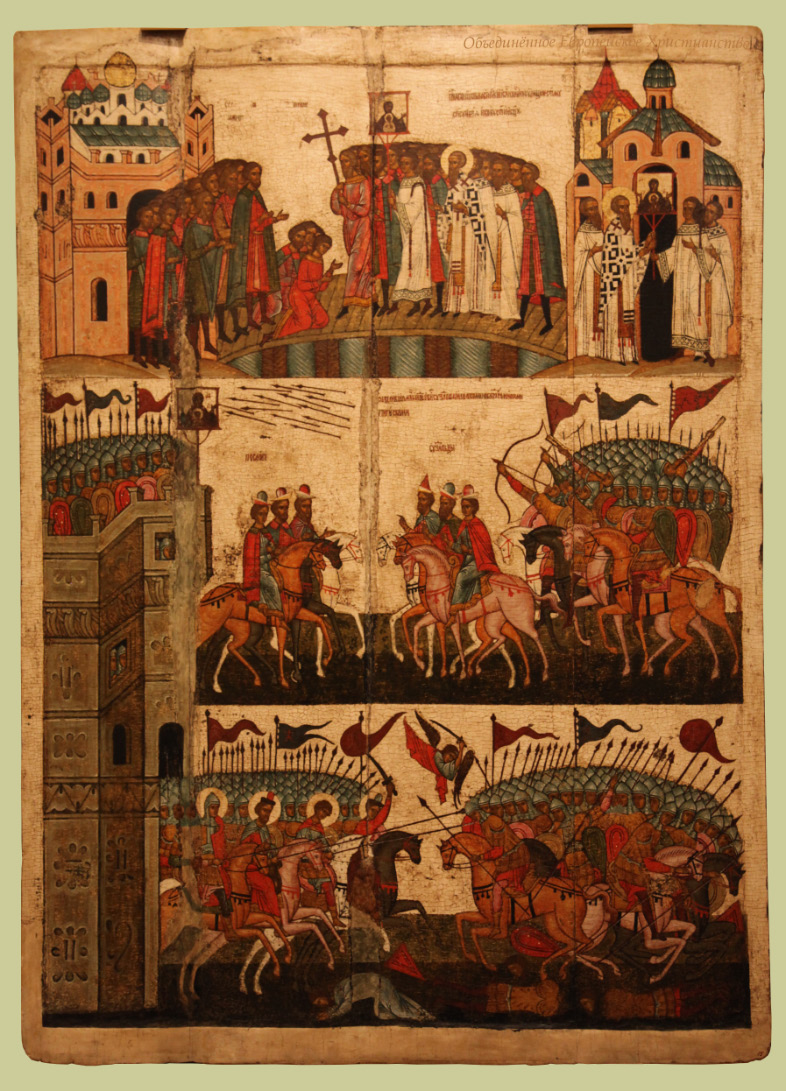 |
|
| |
Битва Новгородцев с Суздальцами в 1169 – The Battle of Novgorod and Suzdal of 1169 |
|
| |
Чудо от иконы «Богоматерь Знамение» – The miracle of the icon "The Virgin of the Sign" |
|
| |
XV century icon in the Новгородский Государственный Музей-Заповедник – Novgorod State Museum-Reserve |
|
| |
The point cannot be too much insisted upon, nor too often repeated, so strange is it to our modern modes of thought, and so essentially characteristic of the first centuries of the Christian era and the formative period during which Christian civilization took its shape. Men lived as citizens of one State which they took for granted and which they even regarded as eternal. There would be much grumbling against the taxes and here and there revolts against them, but never a suggestion that the taxes should be levied by any other than imperial authority, or imposed in any other than the imperial manner. There was plenty of conflict between armies and individuals as to who should have the advantage of ruling, but never any doubt as to the type of function which the "Emperor" filled, nor as to the type of universally despotic action which he exercised. There were any number of little local liberties and customs which were the pride of the separate places to which they attached, but there was no conception of such local differences being antagonistic to the one life of the one State. That State was, for the men of that time, the World.
The complete unity of this social system was the more striking from the fact that it underlay not only such innumerable local customs and liberties, but an almost equal number of philosophic opinions, of religious practices, and of dialects. There was not even one current official language for the educated thought of the Empire: there were two, Greek and Latin. And in every department of human life there co-existed this very large liberty of individual and local expression, coupled with a complete, and, as it were, necessary unity, binding the whole vast body together. Emperor might succeed Emperor, in a series of civil wars. Several Emperors might be reigning together. The office of Emperor might even be officially and consciously held in commission among four or more men. But the power of the Emperor was always one power, his office one office, and the system of the Empire one system.
It is not the purpose of these few pages to attempt a full answer to the question of how such a civic state of mind came to be, but the reader must have some sketch of its development if he is to grasp its nature.
The old Mediterranean world out of which the Empire grew had consisted (before that Empire was complete—say, from an unknown most distant past to 50 B.C.) in two types of society: there stood in it as rare exceptions States, or nations in our modern sense, governed by a central Government, which controlled a large area, and were peopled by the inhabitants of many towns and villages. Of this sort was ancient Egypt. But there were also, surrounding that inland sea, in such great numbers as to form the predominant type of society, a series of Cities, some of them commercial ports, most of them controlling a small area from which they drew their agricultural subsistence, but all of them remarkable for this, that their citizens drew their civic life from, felt patriotism for, were the soldiers of, and paid their taxes to, not a nation in our sense but a municipality.
These cities and the small surrounding territories which they controlled (which, I repeat, were often no more than local agricultural areas necessary for the sustenance of the town) were essentially the sovereign Powers of the time. Community of language, culture, and religion might, indeed, bind them in associations more or less strict. One could talk of the Phoenician cities, of the Greek cities, and so forth. But the individual City was always the unit. City made war on City. The City decided its own customs, and was the nucleus of religion. The God was the God of the city. A rim of such points encircled the eastern and central Mediterranean wherever it was habitable by man. Even the little oasis of the Cyrenæan land with sand on every side, but habitable, developed its city formations. Even on the western coasts of the inland ocean, which received their culture by sea from the East, such City States, though more rare, dotted the littoral of Algeria, Provence and Spain.
|
| |
|
Hilaire Belloc, Europe and the Faith, Sine auctoritate nulla vita (1920) |
| |
|
| |
In the place of the old Christian enthusiasms of Europe there came, for a time, the enthusiasm for nationality, the religion of patriotism. But self-worship is not enough, and the forces which are making for the destruction of our culture, notably the Jewish Communist propaganda from Moscow, have a likelier future before them than our old-fashioned patriotism. |
| |
|
Hilaire Belloc, The Great Heresies (1936) |
|
|
|
| |
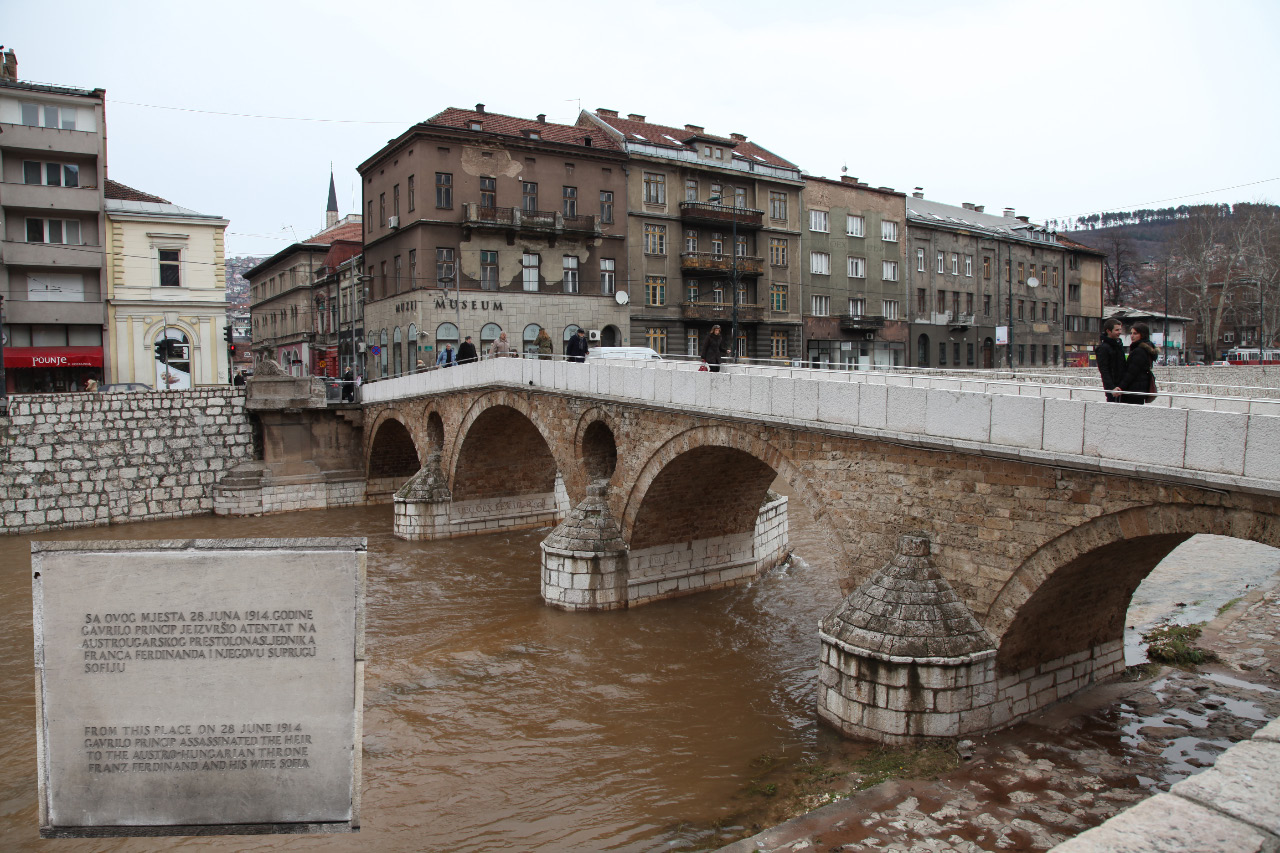 |
|
| |
Latinska ćuprija – Латинска ћуприја – the Latin Bridge, in Sarajevo, dating to 1789, though there was a stone bridge here already by 1565, over the River Miljacka – Миљацка. Commentary elsewhere. |
|
| |
Though the son of a hero, Петар Принцип-Petar Princip, who had fought the oppression of the Muslim Ottoman Turks and who named his son after Archangel Saint Gabriel, unfortunately the dirty little coward with a napoleon complex, Гаврило Принцип – Gavrilo Princip (25 July [O.S. 13 July] 1894 – 28 April 1918), didn't think it was enough to join with Muslims in the "Black Hand - Црна рука" in support of some idiotic and historically absurd movement of Pan-Southern Slav Nationalism-Југословенство — Уједињење или смрт – Ujedinjenje ili smrt – Unification or Death.
— ?!? unificaition of what and under whom and in pursuit of what ?!? —
... and to murder on 28 June 1914 the heir to the throne of the thousand-year-old Donaumonarchie, Archduke Franz Ferdinand — unwittingly setting in motion the events which lead to the Great Twentieth Century Civil War of European Christendom 1914-1945. Instead the little shit also murdered his wife, the Bohemian-Czech, Žofie-Sophie. Franz Ferdinand was a friend of the Slavs and of subsidiarity and of making the Slavic peoples equal partnes in the Austro-Hungarian Empire, a Third Crown to join those of Austria and Hungary, so the nationalists and confused irredentists saw him, however paradoxically, as an enemy. During the Communist-cum-bizarre-Nationalist Yugoslav-Southern Slav days/experiment, the Latin Bridge was actually renamed after this absurd peti-personage: the Princip Bridge – Принципов мост! |
|
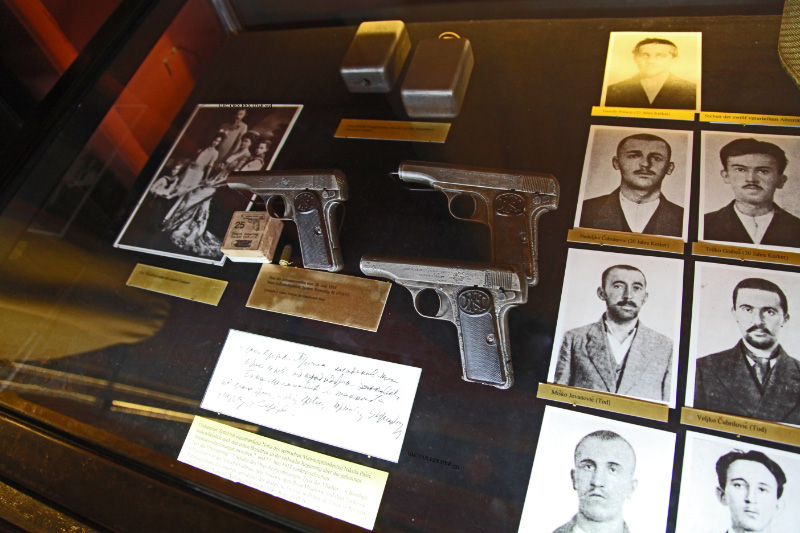 |
|
|
| |
|
... in Heeresgeschichtliches Museum in Vienna. |
| |
|
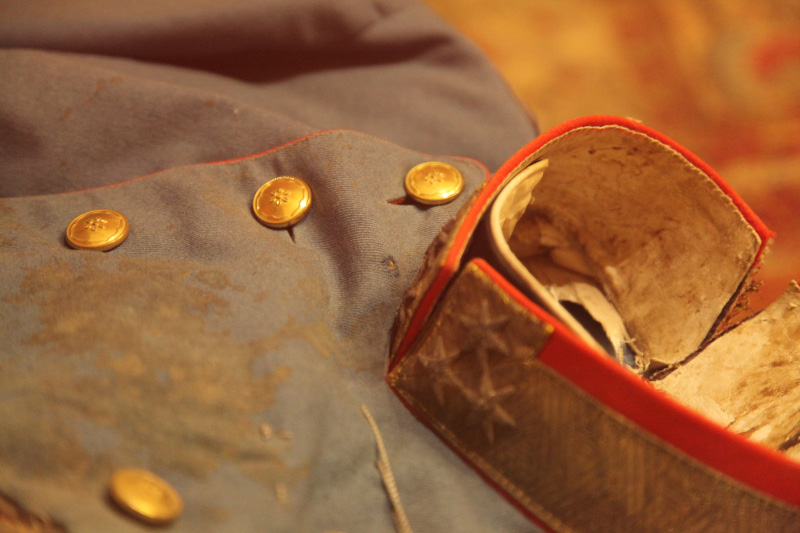 |
| |
|
... the bloodied uniform in which Archduke Franz Ferdinand was murdered along with his wife in Sarajevo. |
| |
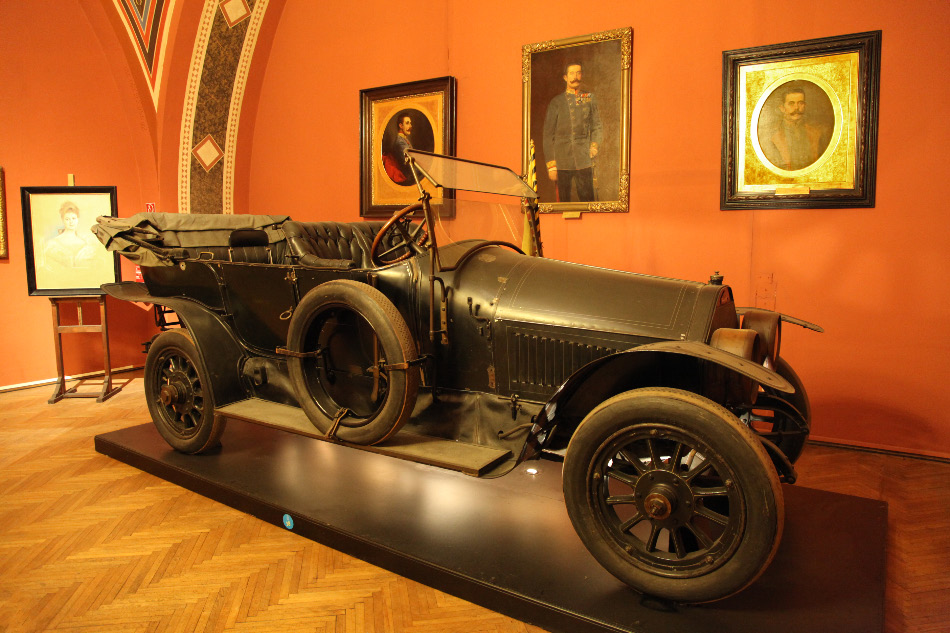 |
|
| |
Also in the in Heeresgeschichtliches Museum in Vienna., the car in which Archduke Franz Ferdinand and his wife Sophie were murdered. |
|
| |
| Nota Bene, discussion here regards, variously, the evilness and stupidity of nationalism by Christians and within Christendom. |
| |
|
|
| |
Nationalism in connection with the followers of false religions, and their civilizations and societies, involves very different considerations. One thinks especially of Islam. In the realm of Realpolitik, nationalism is very often in the most brutal competition with so-called fundamentalism. Fundamentalism in Islam simply means real Islam, though yes, as a practial matter, now in the post-colonialism, post-communism early decades of our XXI century, many nominal Muslims may not much heed the teachings and priorities of Islam, however much they will revert back to Islam in the end.
In this struggle within the Muslim world between the fundamentalists and the nationalists, it is the nationalists who are, though only in comparative terms, more likely to be the "good guys". The nationalists — Iraq's Saddam Hussein, Syria's Assad (father and son), Egypt's Hosni Mubarak, by way of the most prominent examples — were the protectors of the large Christian minorites, peoples resident for millenia within the nation-states over which they held sway. (In the case of Bashar al-Assad still clinging to power.) It bares repeating. One speaks in comparative terms. Christians did suffer oppression and attacks under the regimes of these three. We are after all speaking of Muslims and their regimes. But the comparative virtue of the Muslim nationalists of course meant that the twin enemies of the American people and of European Christendom generally, the Democratic Party and the Republican Party, the latter, and its mass media, completely dominated by the Neo Conservatives and their Shills (the Neo-Cons), stepped into the fray with decades-long, multi-trillion dollar assistance to the enemies of Christianity, the Church and Christendom. (The money belonged to Christian America before it was stolen through taxation extractions and Quantitative Easing - Zero Interest Rates.) On these matters, touching on relations between states of European Christendom, on the one hand, and states of the Muslim world, on the other, Russia's president, Vladimir Vladimirovich Putin, has much more wisdom, a much better compass, than do the leaders of "the West". Not perfect, Putin is a defender of Christian peoples in the Middle East and once-Christian northern Africa. The political leadership of the United States of American is treating Christians as enemies, it has been for decades. Reflect on Serbia and Kosovo and Iraq and Syria. But guilt is hardly restricted to Slick Willy and the Shrubbery, however damnable their leadership.
Very few of the citizens of the United States of America have sufficient information to allow them to understand this grand seeming paradox. Indeed, most can not even comprehend much smaller and more immediate perverse paradox that, after the small attacks on America perpetrated on September 11th, 2001 by Saudi Arabian fundamentalists, the Neo-Con regime in the United States attacked the chief enemy of the Saudi regime, the Arab nationalist regime of Saddam Hussein's Iraq. We attacked, not those who attacked us, but the enemies of those who attacked us!
Small attacks of 9/11, did we say? No disrespect intended for those personnally impacted. For everyone else it would be more dignified to lose entirely the absurd "day that changed the world"– mantra. To non-moronic Americans, like the present writer, also a veteran officer of the United States Army, it is embarrassing. Reflect on 100,000 dead per day through much of Operation Barbarossa. If 9/11 changed the course of history it is only for the reason that forces of evil within America seized the pretext. What might instead have happened, if America were governed not be so-called Liberal or so-called Conservative enemies of the people, but rather by people who saw the United States of America as constituent component of European Christendom trying, for example, to achieve harmony and symphony with Russia, 9/11 could have been seized upon for a taking stock exercise. Significantly, immigration policy favoring demographic replacement of the Descendants of European Christendom through many millions mass immigration of everyone other than the Descendants of European Christendom could have been revisited and reversed. A spiritual taking stock of still greater importance might have been undertaken. But we digress.
Objectionable nationalism is that which diverts energies away from the mission of the Church and from the work of building and preserving Christendom, the community of Christian nations and civilizational integrity.
Objectionable is also simply that which makes us ridiculous. |
|
|
| |
Controlled Opposition and Competing Evils, and Guess Who is Leading Both Sides |
|
| |
|
|
| |
Communism vs. Capitalism |
|
| |
... in both cases in their real-world, as-practiced forms, degenerated into: |
|
| |
|
|
| |
Enslavement to diabolical atheist Kommisars vs. Enslavement to diabolical atheist Plutocrats |
|
| |
and we can also show the connection to that other intricately-associated false choice which has emerged between these two sickening alternatives, namely that of the participates and real proprietors of European Christendom being forced into the choice between one or the other of the camps of |
|
| |
|
|
| |
Sodomy vs. Usury |
|
| |
And there are other of these false dichotomies whose connectedness can be demonstrated, such as that of |
|
| |
|
|
| |
Keynesian downward debt spiral vs. Economic strangulation through adherence to monetary Gold Standard |
|
| |
... both to the peril of the prosperity of, or even the survivability of, Christian laboring families, that is, of real people. |
|
| |
|
|
| |
Perhaps in a similar vien we can turn in time to the debunking of other false dichotomies, poisonous to lived Christianity and to Christendom, distracting deceptions such as: |
|
| |
Ustaše vs. Slobodan Milošević |
|
| |
|
|
| |
Small State Nationalism: the Lithuanian Case |
|
|
| |
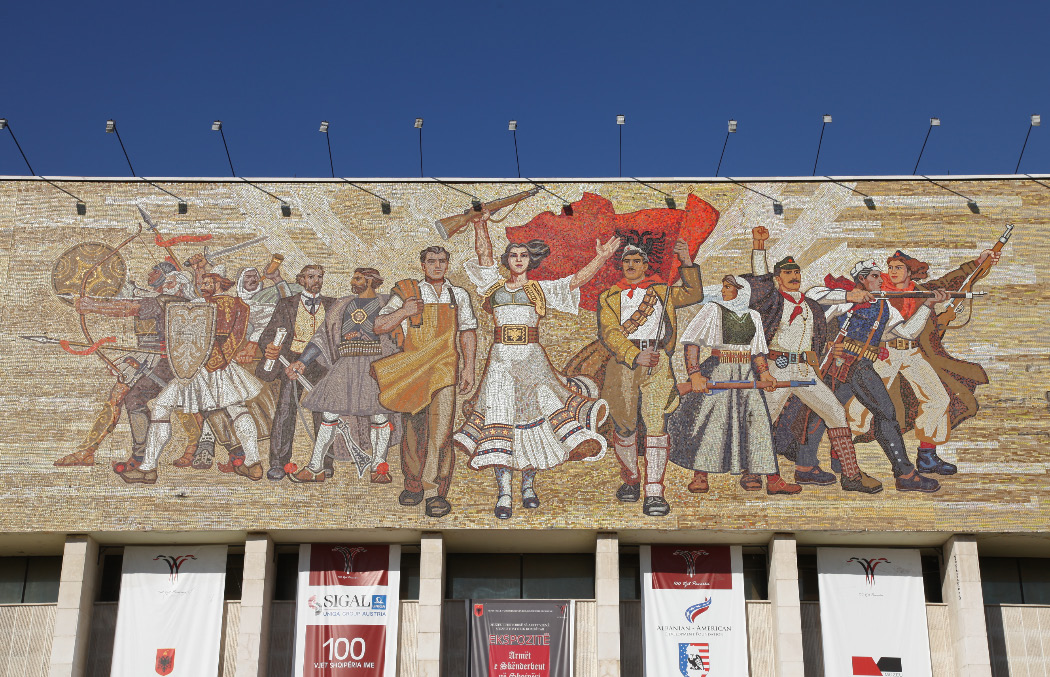 |
|
| |
|
To delight and serve the communist-cum-nationalist leader Enver Hoxha (in power from 1944 until his heart attack and burial in 1985 in a pyramid to make Mao take pause) this nationalist mosaic adorns the facade of the National History Museum in Tirana.
Hey, a woman soldier leads the way!
The Communists were prominent among those at the vanguard of this movement, to help destroy the bedrock of Christian civilization — the family — through the additional means of turning women into soldiers and therewith destroying in men the instinct to protect women and children. |
|
|
| |
"The only thing the Church can never sanction, and in that she is the faithful organ of the truth and the will of God, is divisions and national rivalries as a definitive condition of human society. The true Church will always condemn the doctrine that affirms that there is nothing beyond national interests, this new paganism which makes a nation its supreme deity, this false patriotism which wishes to replace religion. ...
"It is not in the West, it is in Byzantium that the original sin of nationalist particularism and cesaro-papist absolutism have, for the first time, introduced death to the social body of Christ. And the successor of Byzantium now with responsibility is the Russian Empire. And today, Russia is the only country in Christendom where the national State affirms without reserve its exclusive absolutism in making of the Church an attribute of nationality and a passive instrument of the secular government ..." |
|
| |
|
L’Idée russe – Русская Идея –The Idea of Russia, by Владимир Сергеевич Соловьёв – Vladimir Sergeyevich Solovyov, Paris, 1888 |
|
| |
Only one nation is 'god-bearing,' that's the Russian people? |
|
| |
|
|
|
|
| |
|
|
|
|
| |
— Низвожу бога до аттрибута народности? — вскричал Шатов, — напротив, народ возношу до бога. Да и было ли когда-нибудь иначе? Народ — это тело божие. Всякий народ до тех только пор и народ, пока имеет своего бога особого, а всех остальных на свете богов исключает безо всякого примирения; пока верует в то, что своим богом победит и изгонит из мира всех остальных богов. Так веровали все с начала веков, все великие народы по крайней мере, все сколько-нибудь отмеченные, все стоявшие во главе человечества. Против факта идти нельзя. Евреи жили лишь для того, чтобы дождаться бога истинного, и оставили миру бога истинного. Греки боготворили природу и завещали миру свою религию, то-есть философию и искусство. Рим обоготворил народ в государстве и завещал народам государство. Франция в продолжение всей своей длинной истории была одним лишь воплощением и развитием идеи римского бога, и если сбросила наконец в бездну своего римского бога и ударилась в атеизм, который называется у них покамест социализмом, то единственно потому лишь, что атеизм всё-таки здоровее римского католичества. Если великий народ не верует, что в нем одном истина (именно в одном и именно исключительно), если не верует, что он один способен и призван всех воскресить и спасти своею истиной, то он тотчас же перестает быть великим народом и тотчас же обращается в этнографический материал, а не в великий народ. Истинный великий народ никогда не может примириться со второстепенною ролью в человечестве, или даже с первостепенною, а непременно и исключительно с первою. Кто теряет эту веру, тот уже не народ. Но истина одна, а, стало быть, только единый из народов и может иметь бога истинного, хотя бы остальные народы и имели своих особых и великих богов. Единый народ "богоносец" — это- русский народ и... и... и неужели, неужели вы меня почитаете за такого дурака, Ставрогин, — неистово возопил он вдруг, — который уж и различить не умеет, что слова его в эту минуту или старая, дряхлая дребедень, перемолотая на всех московских славянофильских мельницах, или совершенно новое слово, последнее слово, единственное слово обновления и воскресения и... и какое мне дело до вашего смеха в эту минуту! Какое мне дело до того, что вы не понимаете меня совершенно, совершенно, ни слова, ни звука!.. О, как я презираю ваш гордый смех и взгляд в эту минуту! |
|
“I reduce God to the attribute of nationality?” cried Shatov. “On the contrary, I raise the people to God. And has it ever been otherwise? The people is the body of God. Every people is only a people so long as it has its own god and excludes all other gods on earth irreconcilably; so long as it believes that by its god it will conquer and drive out of the world all other gods. Such, from the beginning of time, has been the belief of all great nations, all, anyway, who have been specially remarkable, all who have been leaders of humanity. There is no going against facts. The Jews lived only to await the coming of the true God and left the world the true God. The Greeks deified nature and bequeathed the world their religion, that is, philosophy and art. Rome deified the people in the State, and bequeathed the idea of the State to the nations. France throughout her long history was only the incarnation and development of the Roman god, and if they have at last flung their Roman god into the abyss and plunged into atheism, which, for the time being, they call socialism, it is solely because socialism is, anyway, healthier than Roman Catholicism. If a great people does not believe that the truth is only to be found in itself alone (in itself alone and in it exclusively); if it does not believe that it alone is fit and destined to raise up and save all the rest by its truth, it would at once sink into being ethnographical material, and not a great people. A really great people can never accept a secondary part in the history of Humanity, nor even one of the first, but will have the first part. A nation which loses this belief ceases to be a nation. But there is only one truth, and therefore only a single one out of the nations can have the true God, even though other nations may have great gods of their own. Only one nation is 'god-bearing,' that's the Russian people, and . . . and . . . and can you think me such a fool, Stavrogin,” he yelled frantically all at once, “that I can't distinguish whether my words at this moment are the rotten old commonplaces that have been ground out in all the Slavophile mills in Moscow, or a perfectly new saying, the last word, the sole word of renewal and resurrection, and . . . and what do I care for your laughter at this minute! What do I care that you utterly, utterly fail to understand me, not a word, not a sound! Oh, how I despise your haughty laughter and your look at this minute!” |
|
| |
|
|
|
|
| |
|
|
from Бесы – Demons or The Devils or The Possessed, 1871-1872,
by Фёдор Михайлович Достоевский – Fyodor Mikhailovich Dostoyevsky
(* 30 October [N.S. 11 November] 1821 — 28 January [N.S. 9 February] 1881 †)
Часть вторая, Глава первая – Part II, Chapter 1 |
|
| |
|
|
|
|
| |
L'ossuaire de Douaumont - within the Verdun battlefield |
|
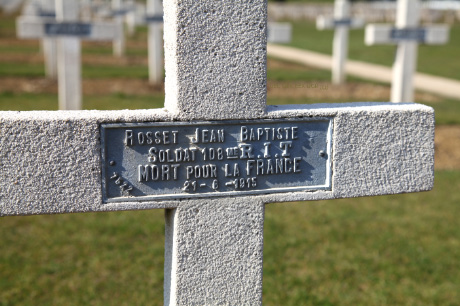 |
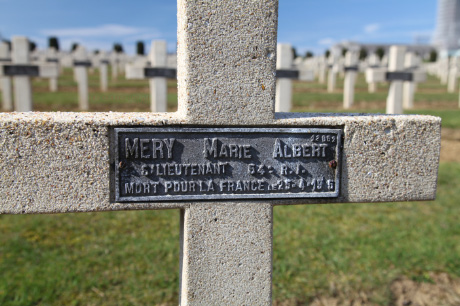 |
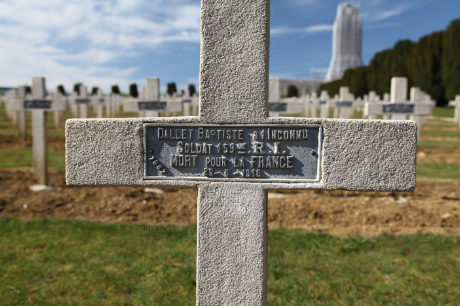 |
| |
... begging the Lord that these men live with Him forever. |
|
| |
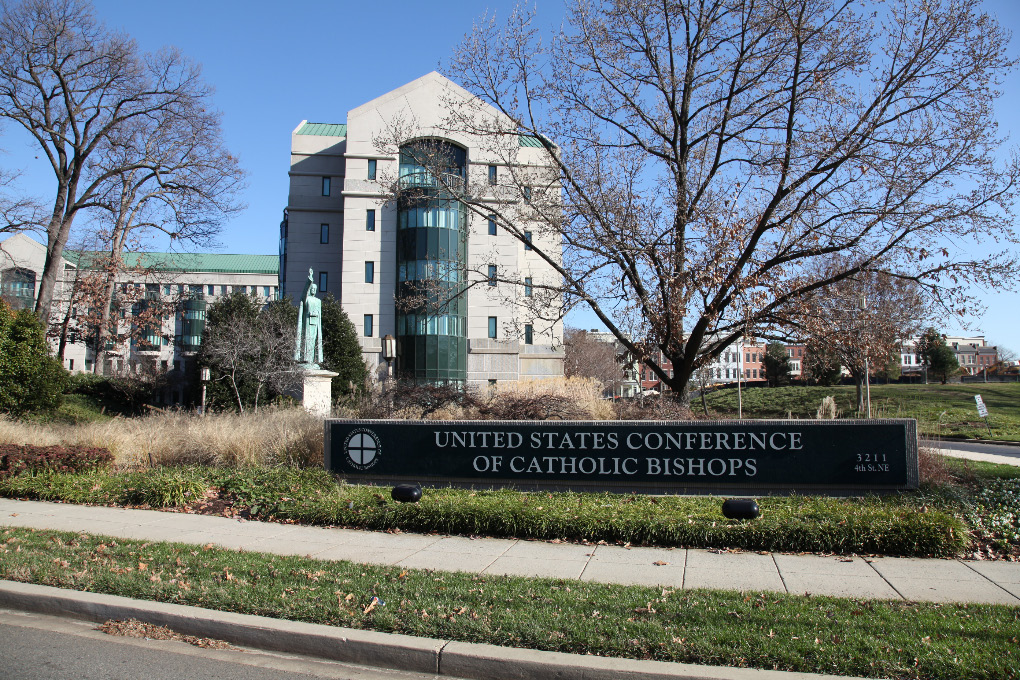 |
|
| |
However good and necessary subsidiarity is in principle — in Church Militant and in Christendom — if leaders abandon orthodoxy, expect nothing good. Here at the United States Conference of Catholic Bishops we find Homosexualism's Headquarters, together with the "Catholic" Establishment Media's hush-it-up-and-divert-attention-to-ridiculous-distractions-and-details main media, the Catholic News Service, together with like organizations (EWTN; Catholic News Agency; the National Catholic Register; the Ethics and Public Policy Center, the National Conference of Christians and Jews, etc. ad nauseam): the Fifth Column of enemies of the Church within the Church. By the way, have any of you run into Wuerl Girl lately? Well, who knows, maybe he is busy overseeing the installation of a sauna in his mansion. A perfect successor to the other traitor prelates who have been at the heart of the USCCB since its 1966 inception as the as the National Conference of Catholic Bishops (NCCB) + the United States Catholic Conference (USCC), men like Cardinal Dearden and Cardinal Bernardin, and other co-spiritualists such as Monsignor John Joseph (Jack) Egan and his mentor, atheist Jew Saul Alinsky (who wrote his Rules for Radicals at Msgr. Egan's request), and Alinsky's mentor (to whom he dedicated his Rules for Radicals), Lucifer, Satan, the Devil. Recreator of the University of Notre Dame in South Bend in Indiana, Theodore Martin Hesburgh, sometime sponsor and protector of Msgr. Egan, was also heavily involved with this circle of evil.
Nota bene, things ain't better up north in Canada.
And why was Bella Dodd (* 1904, baptized Maria Assunta Isabellar in Italy – 1969 †) able to re-turn, repentent, to the Church (with a little help from her friends, like Bishop Fulton Sheen), while Saul Alinsky (1909 – 1972) very much seems not to have turned away from evil? He could not find a real friend? |
|
| |
|
|
|
|
|
|
|
|
| |
Evangelii Gaudium |
|
|
|
|
|
|
|
| |
|
|
|
|
|
|
|
|
|
| |
Apostolic Exhortation of Poper Francis to the bishops, clergy, consecrated persons and the lay faithful on the Proclamation of the Gospel in Today's World.
24 November 2013 |
|
|
|
|
|
| |
|
II. Pastoral activity and conversion |
|
|
|
|
| |
|
|
An ecclesial renewal which cannot be deferred |
|
|
|
|
| |
|
|
|
|
|
|
|
|
|
| |
|
|
|
32. Since I am called to put into practice what I ask of others, I too must think about a conversion of the papacy. It is my duty, as the Bishop of Rome, to be open to suggestions which can help make the exercise of my ministry more faithful to the meaning which Jesus Christ wished to give it and to the present needs of evangelization. Pope John Paul II asked for help in finding “a way of exercising the primacy which, while in no way renouncing what is essential to its mission, is nonetheless open to a new situation”.[35] We have made little progress in this regard. The papacy and the central structures of the universal Church also need to hear the call to pastoral conversion. The Second Vatican Council stated that, like the ancient patriarchal Churches, episcopal conferences are in a position “to contribute in many and fruitful ways to the concrete realization of the collegial spirit”.[36] Yet this desire has not been fully realized, since a juridical status of episcopal conferences which would see them as subjects of specific attributions, including genuine doctrinal authority, has not yet been sufficiently elaborated.[37] Excessive centralization, rather than proving helpful, complicates the Church’s life and her missionary outreach. |
|
| |
|
|
|
|
|
|
|
|
|
| |
|
|
|
|
[35] Encyclical Letter of Pope John Paul II, Ut Unum Sint (25 May 1995), 95: AAS 87 (1995), 977-978.
[36] Second Vatican Ecumenical Council, Dogmatic Constitution on the Church Lumen Gentium, 23.
[37] John Paul II, Motu Proprio Apostolos Suos (21 May 1998): AAS 90 (1998), 641-658. |
|
| |
|
|
|
|
|
|
|
|
|
|
|
... Not so Holy Rus' . |